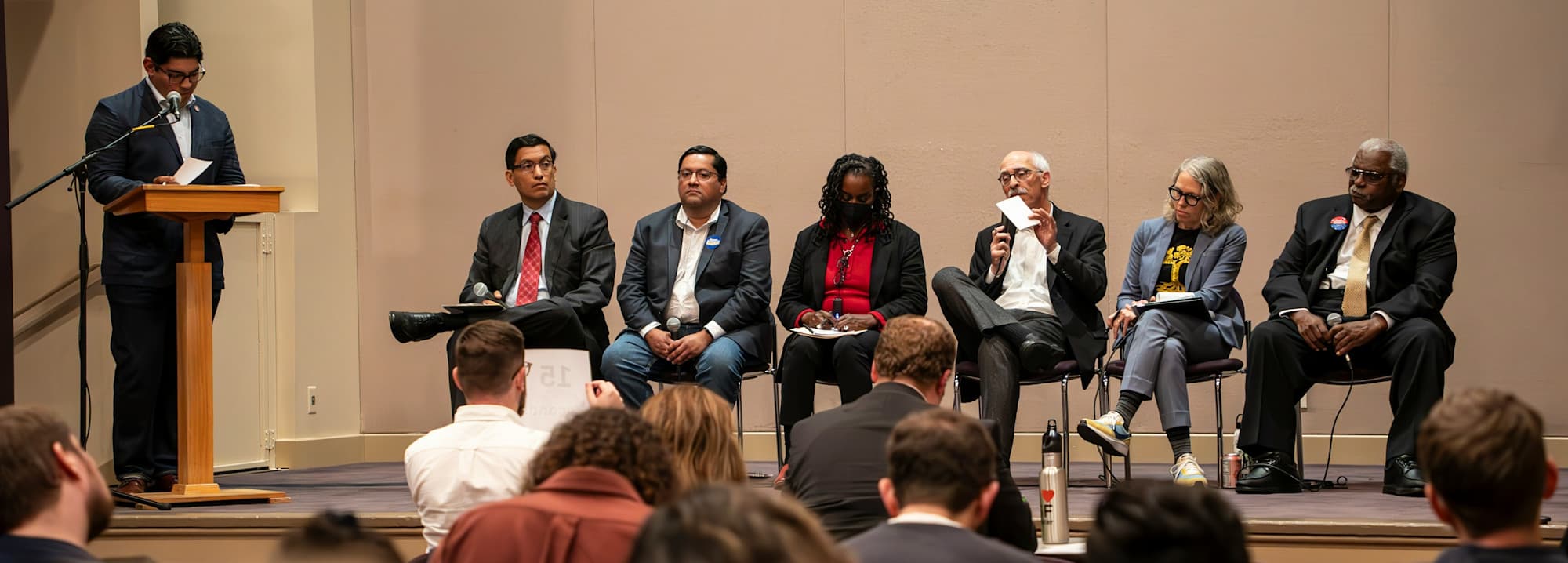
Candidate Forum Guide: Tips for Voters and Candidates
Candidate forums are a rare chance for voters to hear from every candidate side by side. They also provide candidates an opportunity to share their message directly with the community. Unlike campaign ads or social media posts, candidate forums put substance and presence front and center. They’re about dialogue, contrast, and credibility, and they’re an important tradition whether you’re sitting on the stage or in the audience.
This guide will cover what candidate forums are, how to prepare, and how to make the most of them, whether you’re a participant or a voter.
What Is a Candidate Forum?
A candidate forum is a structured event where all candidates for a given office are invited to speak, answer questions, and share their views with the public.
Unlike a debate, forums tend to be less confrontational. They are usually moderated and focused on giving each candidate equal time to address key issues. Unlike town halls, forums are candidate-centered rather than constituent-centered. The public listens, asks questions, and compares the candidates on stage.
Forums are often hosted by civic groups, nonprofits, or organizations like the League of Women Voters, which has a long history of running nonpartisan candidate forums across the country.
The core goal of a candidate forum is simple: help voters make informed choices by comparing candidates directly, side by side.
Why Candidate Forums Matter
Candidate forums play an essential role in elections, especially at the local level, where campaign budgets are smaller and media coverage is limited.
Some benefits of campaign forums for voters include:
Direct Comparison: Forums are often the only time voters see all candidates for an office in the same room.
Transparency and Accountability: Candidates must answer tough questions publicly, without a filter.
Community Voice: Many forums include a Q&A session where voters can ask questions and raise concerns, giving the community an opportunity to speak directly to those in power.
Trust-Building: Seeing how candidates speak, carry themselves, and respond under pressure helps voters assess not just policy, but temperament and character.
At the same time, forums are a crucial tool for candidates to build:
Visibility: Some attendees may not have seen you or heard your message before.
Content: Forums often draw local media coverage and generate clips that can be reused on social media.
Credibility: Sharing the stage with other contenders signals seriousness and legitimacy.
Connection: Forums let candidates hear voter concerns firsthand and create memorable moments that can stick with audiences long after the event.
Contrast: Candidates can highlight differences with opponents, in policy, values, or tone, without resorting to attack ads.
Candidate forums give campaigns something money can’t always buy: authentic visibility. Unlike ads or mailers, these events show voters how you think, react, and connect in real time. For Independent candidates especially, forums level the playing field, offering a stage where ideas and values matter more than party labels or fundraising totals.
LEARN MORE: Explore more ways candidates can engage with voters.
What to Expect at a Candidate Forum
While formats vary, most forums follow a predictable flow:
Opening Remarks: The moderator introduces the event and explains the ground rules.
Candidate Introductions: Each candidate delivers a short opening statement about their background and reasons for running.
Q&A or Issue Rounds: Moderators ask pre-planned or audience-submitted questions. Candidates answer in turn, usually within strict time limits, like one or two minutes per response.
Rebuttals or Follow-Ups: Some forums allow brief rebuttals or clarifications after each round.
Audience Questions: Many forums include a public Q&A session.
Closing Statements: Each candidate offers a final message to voters.
Expect forums to be structured, timed, and tightly moderated to keep things fair and on track.
Candidate Forums vs. Debates vs. Town Halls
It’s easy to confuse these civic events, but each serves a unique purpose:
Candidate Forums: Structured, moderated, equal-time events where all candidates share their views.
Debates: More confrontational, with candidates directly challenging one another. Delivery and contrast matter most.
Town Halls: Community-centered events where constituents ask questions directly to one candidate or official.
Each format adds value to democratic participation, but forums are often the best side-by-side comparison tool for voters.
LEARN MORE: See how you can participate in town hall meetings whether you’re a candidate or community member.
6 Tips for Candidates Preparing for a Forum
Candidate forums can feel intimidating, but with the right preparation, they can also become one of the most effective tools in your campaign.
#1: Focus on Impressions, Not Perfect Answers
Candidate forums aren’t pop quizzes. They’re opportunities to leave a lasting impression. Voters rarely remember exact words; they remember how you made them feel and whether you seemed prepared, confident, and authentic.
Some ways to focus on impressions instead of chasing perfect answers:
Keep it simple. Deliver clear, concise responses that anyone in the room can repeat later.
Stay composed. A calm presence under pressure often matters more than the details of your answer.
Highlight one or two key lines. Memorable phrases can stick with voters long after the forum ends.
Show authenticity. Voters respond to candidates who speak from values and real stories, not scripts.
Think of a forum as less about “winning” every exchange and more about showing voters you’re capable, trustworthy, and aligned with their priorities.
#2: Prepare Three Key Points
You don’t need to memorize answers to every possible question. Instead, go in with three clear points that you want voters to remember about you and your campaign.
Some ways to prepare your three points effectively:
Define your core message. What’s the one thing you want voters to know about you above all else?
Choose two supporting priorities. Pick issues that matter most in your community and connect to your campaign vision.
Attach each point to a story. Real stories from your district make your message relatable and memorable.
Practice pivots. No matter the question, learn to bring the conversation back to one of your three points.
Your three points could be making housing affordable, strengthening schools, and ensuring government works for everyone. Or, it could be more focused, like promising to make every decision transparently, with accountability, and with an emphasis on fairness. It depends on your campaign message, personal values, and community needs.
Regardless of what your points are, they should be the themes you return to throughout the forum, so voters leave with a clear picture of who you are and what you stand for.
LEARN MORE: Build a strong foundation for forums and other community engagements by crafting a compelling campaign message.
#3: Use Anchor Phrases to Stay Grounded
Anchor phrases are short, repeatable lines that you can weave into any answer. They act like a compass, always pulling you back to your values and priorities.
Good anchor phrases are simple, repeatable, flexible, and always pivot back to your vision and values.
Some examples of anchor phrases:
“Every decision comes down to how it impacts working families.”
“That’s one perspective, but what I’m hearing from voters is…”
“At the end of the day, this is about building a community where everyone can thrive.”
“My guiding principle is simple: people before politics.”
Think of anchor phrases as the bumper stickers of your campaign message. It’s a phrase that’s short, sticky, and tied to your values. Used well, they give voters something memorable to carry with them after the forum.
#4: Prioritize Delivery and Body Language
What you say matters, but how you say it often matters more. Voters will notice your tone, posture, and composure before they process the details of your answer. Delivery can elevate your message or completely undercut it.
To prioritize delivery and body language:
Use an open posture. Stand or sit tall, keep your shoulders relaxed, and avoid crossing your arms.
Make steady eye contact. Alternate between the moderator, the audience, and your fellow candidates.
Control your voice. Slow down for key points, project clearly, and vary your tone to hold attention.
Don’t forget to stay composed. A calm response is especially powerful if an opponent gets combative, and even the strongest policy points can fall flat without confident, composed body language.
LEARN MORE: It can be challenging to stay composed when discussing recent tragedies or controveries in the news. Learn how to effectively talk about current events with constituents without losing your cool.
#5: Handle Attacks Calmly
Candidate forums sometimes include pointed questions or direct attacks. How you respond to negative campaigning can shape voter impressions more than the attack itself. Staying calm, composed, and value-focused shows leadership under pressure.
Don’t repeat the attack. Repeating it only reinforces your opponent’s message.
Instead, acknowledge, bridge, and deliver:
Acknowledge the concern.
Bridge it using a pivot phrase pointing toward something positive and tied to your campaign.
Deliver your values again so it’s clear what your focus is.
Regardless of what your opponents or attendees might say, keep your cool. Voters notice demeanor first. Anger or defensiveness can overshadow your point. And remember to always bring it back to your vision for the community.
#6: Practice, But Don’t Over-Rehearse
Preparation builds confidence, but sounding robotic can make you seem out of touch. The goal is to practice enough that you feel comfortable pivoting back to your message naturally.
Some ways to practice effectively without over-rehearsing:
Rehearse your opening and closing. These are the most scripted parts of a forum and deserve extra polish.
Drill your anchor phrases. Practice weaving them into different types of answers until it feels natural.
Role-play with a partner. Have someone throw tough or unexpected questions at you so you can practice pivots.
Record yourself. Watch for body language cues and listen to your pacing and tone.
Focus on flow, not scripts. Know your key points and stories, but don’t try to memorize word-for-word answers.
Your practice should be a rehearsal for composure, not memorization. You’re preparing to be flexible, natural, and ready for anything, while keeping your values at the center of every answer.
LEARN MORE: Want a deeper dive into debate and forum prep? Watch our free debates and forums webinar for expert strategies, real examples, and practice tools to sharpen your performance.
Tips for Voters Attending a Candidate Forum
Candidate forums aren’t just for candidates. They’re a civic opportunity for community members to listen, compare, and participate.
Before the forum:
Research who’s running. Know which offices are being contested and who the candidates are.
Write down your concerns. Bring a short list of the issues that matter most to you.
During the forum:
Listen for clarity and values. Do candidates answer clearly, or do they ramble? Do their values align with your own?
Watch body language. Confidence, respect, and authenticity often speak louder than words.
Take notes. Jot down impressions, not just policies, so you can compare later.
After the forum:
Follow up. Visit candidates’ websites, watch for fact-checks in local media, and continue asking questions.
Talk to others. Discussing what you saw helps sharpen your perspective and spreads civic engagement.
Attending a candidate forum is about engaging with the democratic process. By coming prepared, paying attention to more than just policy points, and following up afterward, you can walk away with a clearer sense of who each candidate is and what they stand for. Your presence and participation help keep the conversation accountable, transparent, and centered on the needs of the community.
Suggested Questions to Ask at a Candidate Forum
If your forum allows audience Q&A, asking thoughtful, open-ended questions is a powerful way to hold candidates accountable and determine if they’re someone you want to vote for.
Some example questions and important things to consider before voting for a candidate include:
Public Safety: “What is your plan to keep our neighborhoods safe while ensuring accountability and fairness in policing?”
Education: “How will you support our local schools, teachers, and students?”
Housing: “What steps will you take to expand affordable housing and protect renters?”
Budget: “How will you ensure transparency in how taxpayer dollars are spent?”
Environment: “What role should our community play in addressing climate change locally?”
Local Economy: “How will you support small businesses and good jobs in our area?”
Your question doesn’t have to be perfect. Coming from a place of genuine care is what matters.
Connecting Communities and Candidates with Forums
In an era dominated by social media, candidate forums may feel old-fashioned, but they remain one of the most direct, authentic ways for voters to evaluate candidates.
Forums are about more than who “wins” the night. They’re about:
Building trust between candidates and the community.
Creating memorable moments that reveal candidates’ character and values.
Giving voters the tools to make informed choices.
Whether you’re a candidate preparing for the stage or a voter planning to attend, candidate forums are a cornerstone of civic life.
So, show up. Ask questions. Share your vision. Listen carefully.
Because democracy is about conversations like these, where the future of your community is shaped in real time.
Photo by Zac Bowling on Unsplash
Candidate forums are where voters discover new voices. If you’ve ever imagined being on that stage, explore how GoodParty.org is empowering Independents like you to run for office.

